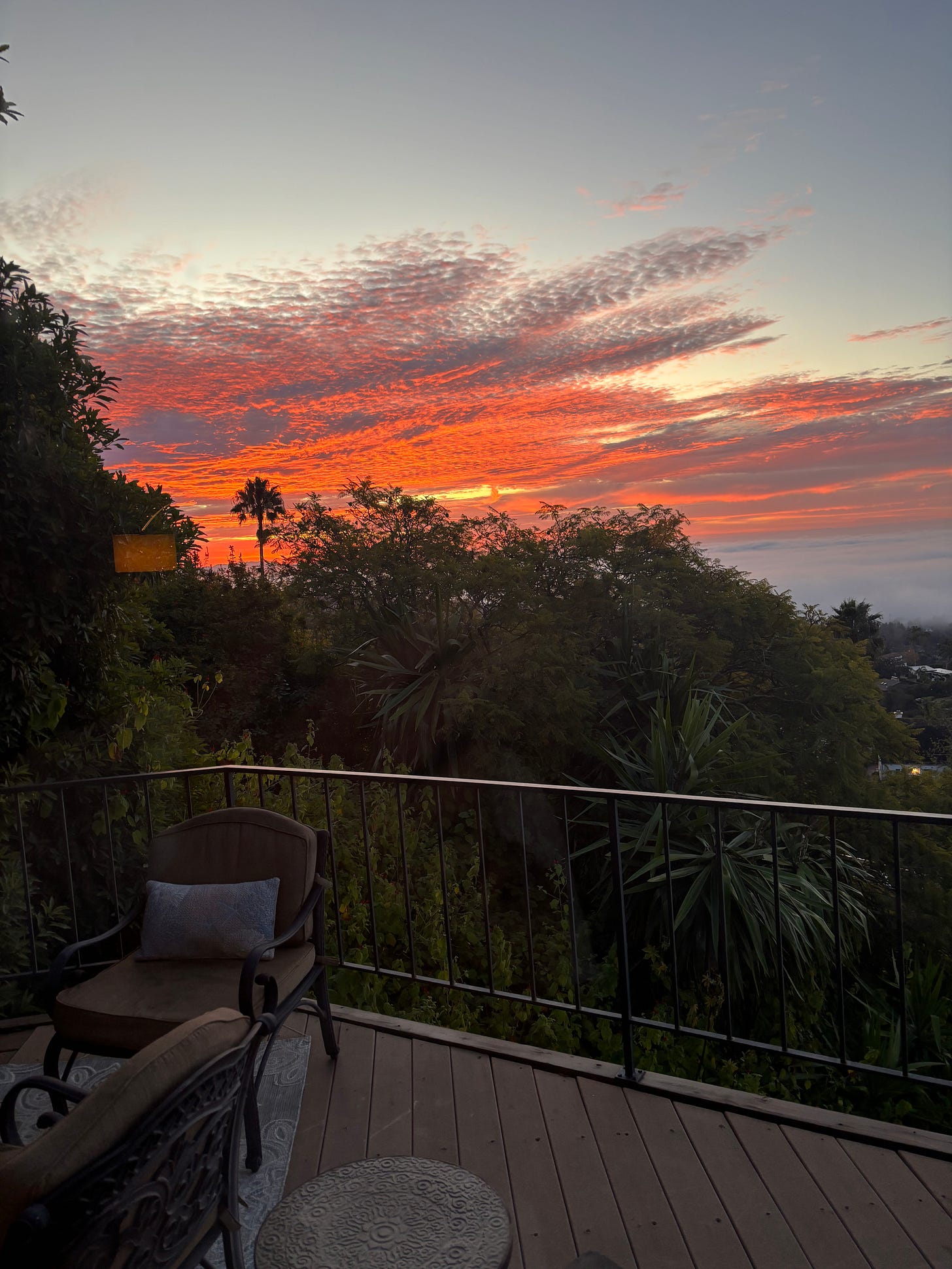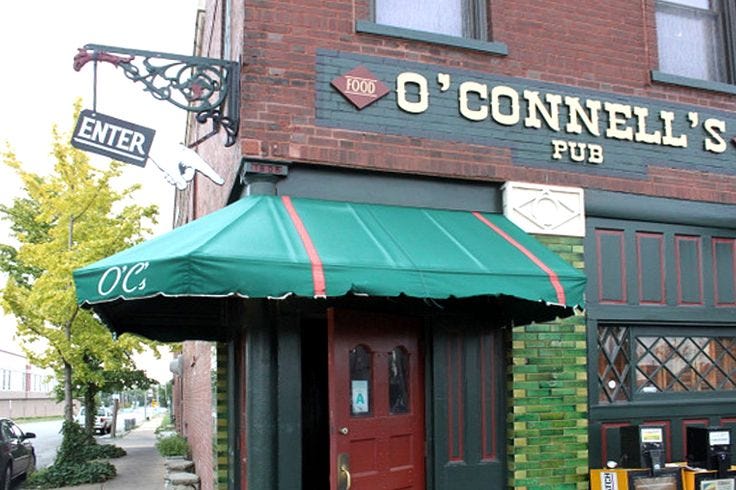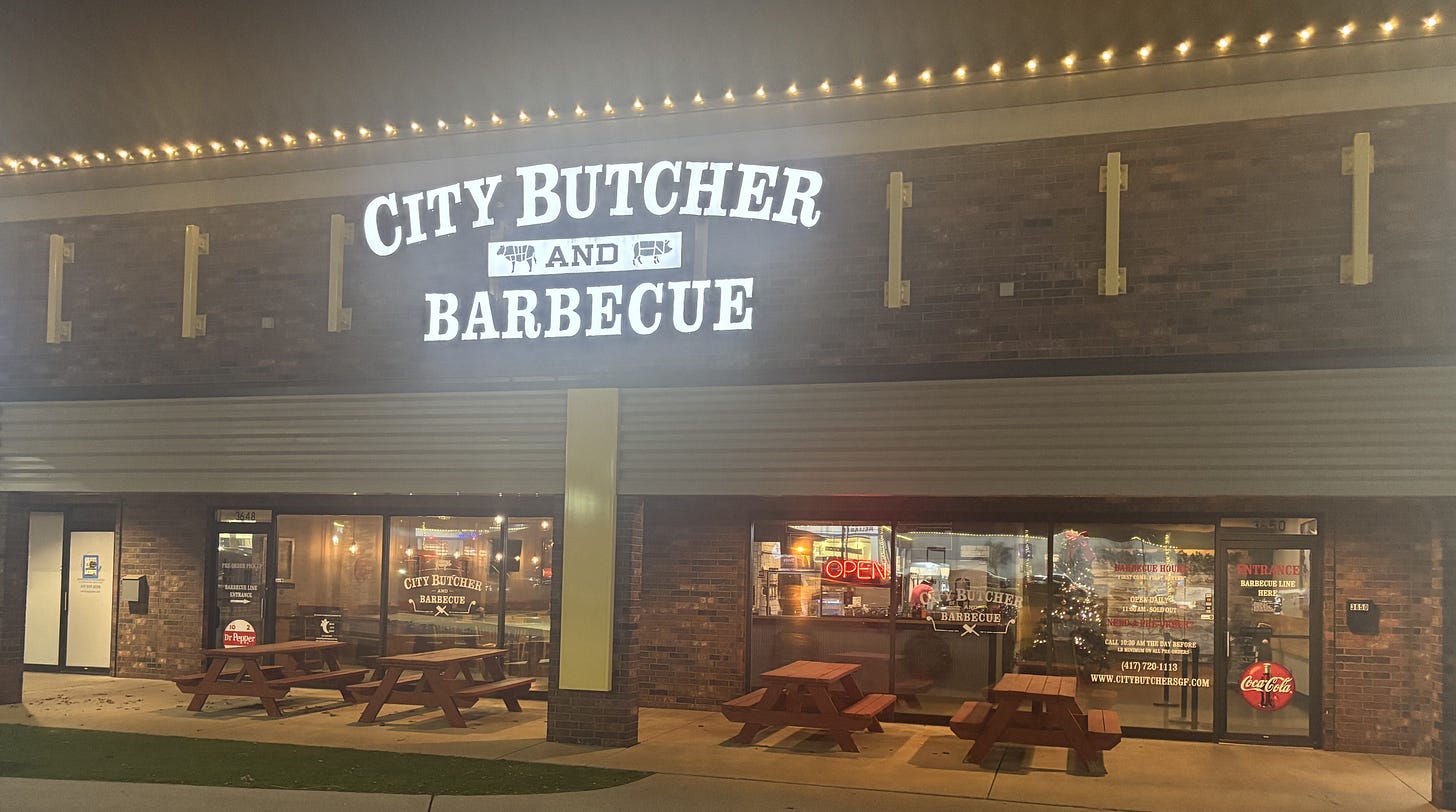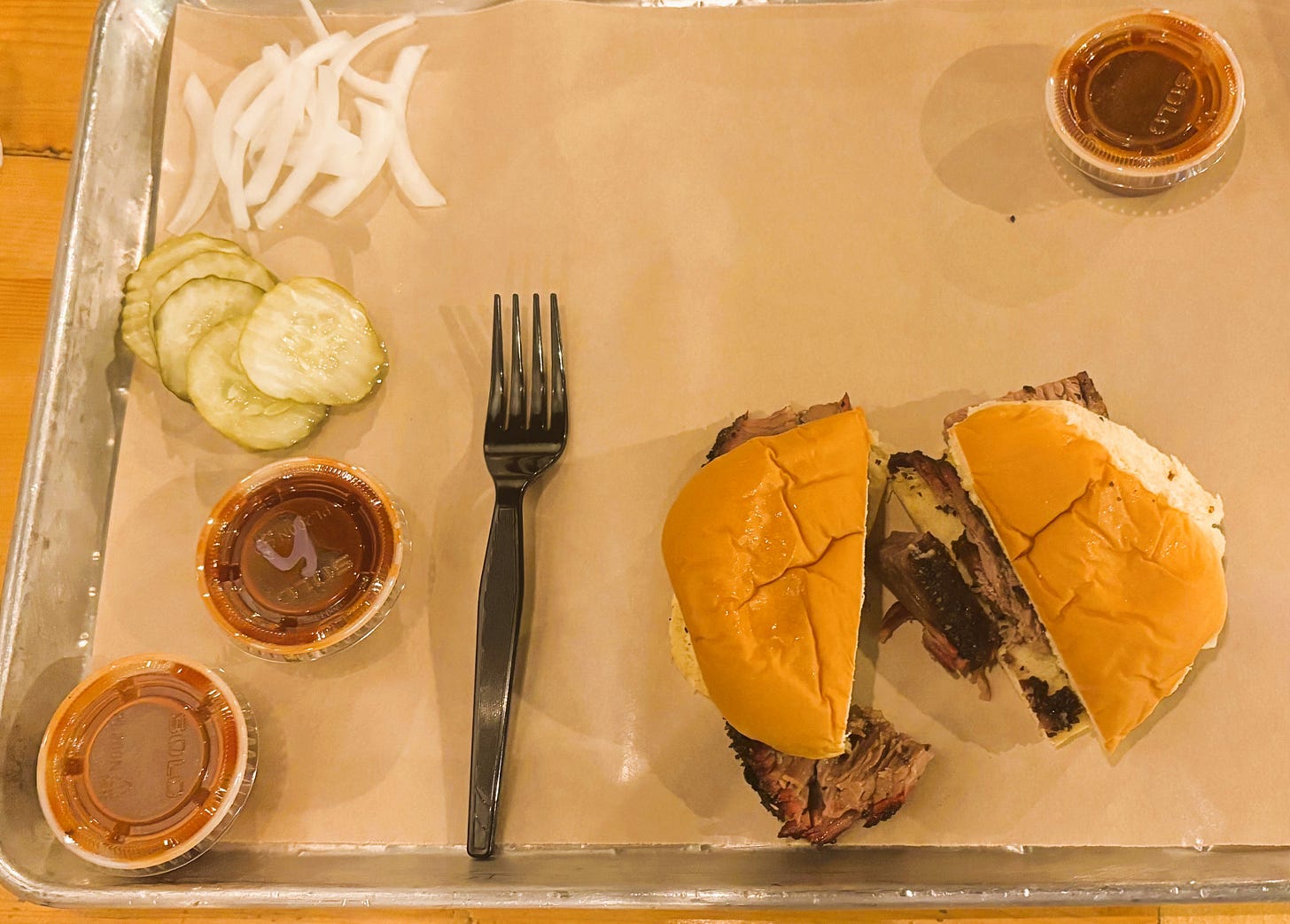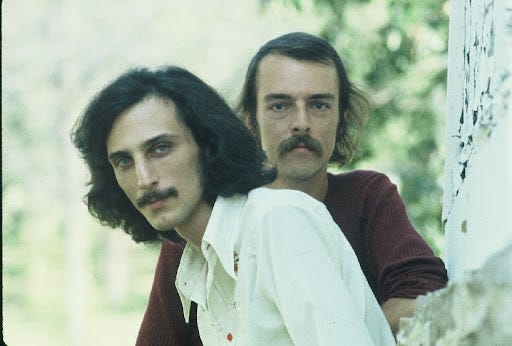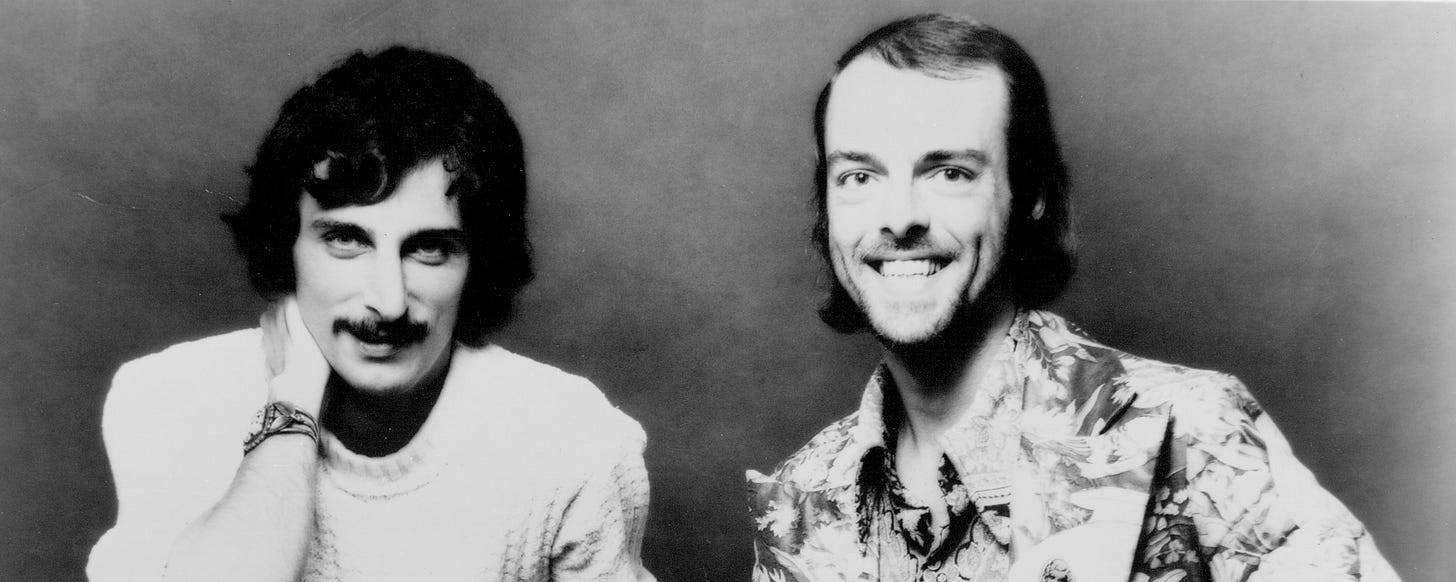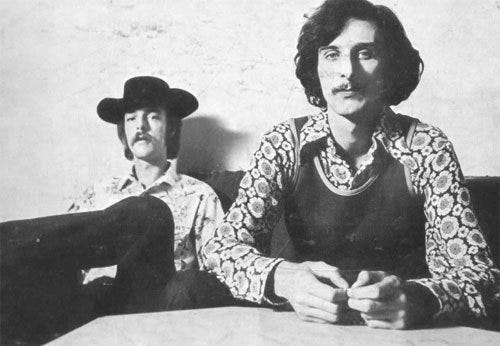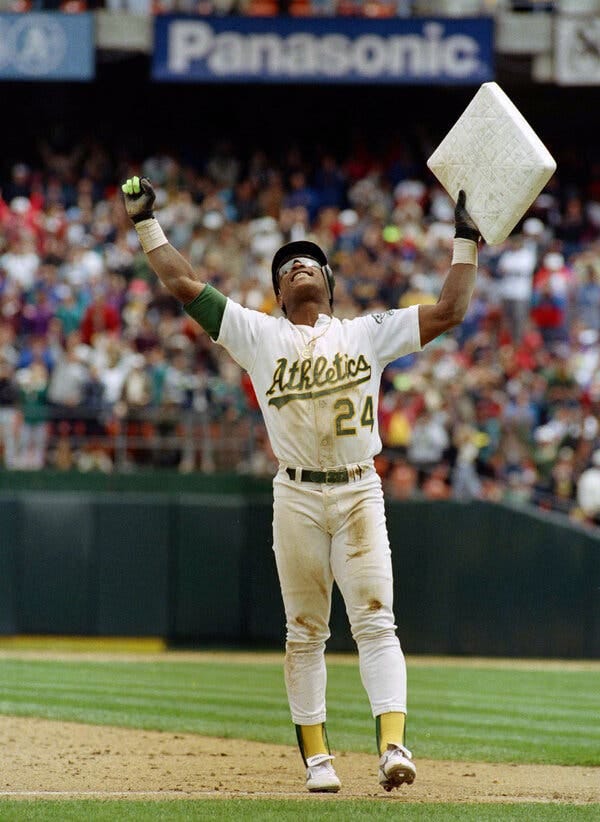Riviera Regency
Twenty Thirty, Missouri Meals, Brewer & Shipley, Rickey Henderson, Slipping Sign
Welcome to my weekly newsletter. This issue includes my favorite songs by Brewer & Shipley, a novel set in the future, two meals at opposite ends of Missouri, a musical duo who moved to Missouri, the king of stolen bases, and a speed limit on ice. I hope you like the picks and pics.
Last week Barb and I drove from Michigan to California to spend the winter near our daughters Tracy and Kathy. We rented a home high on the hills overlooking Santa Barbara and the ocean, in the area known as the American Riviera.
Our place is called the Riviera Regency, and the views here are pretty good. Sunrise from our picture window:
Sunset from our front steps:
Christmas Eve from our balcony:
If you enjoy Fave Five, please share it with your friends who also like books, food, music, sports, or humor. To do so, just click the button below.
Fave Five 116: Riviera Regency
Brooks’s Book (Twenty Thirty), Missouri Meals (O’Connell’s Pub, City Butcher and Barbecue), Missouri Musicians (Brewer & Shipley), Base Burglar (Rickey Henderson), and a Slipping Sign.
Fave Five List: Favorite Songs by Brewer & Shipley
Here are my ten favorite songs recorded by this week’s marvelous musicians.
Rise Up (Easy Rider)
People Love Each Other
Too Soon Tomorrow
One Toke Over the Line
Don’t Want to Die in Georgia
Seems Like a Long Time (by Ted Anderson)
Shake Off the Demon
Rock Me on the Water (by Jackson Browne)
Yankee Lady (by Jesse Winchester)
Crested Butte
Book Best Bet
Twenty Thirty: The Real Story of What Happens to America by Albert Brooks
I bought this book on a lark because it was written by one of the funniest movie makers. It was a thought-provoking view of the future.
From Amazon: June 12, 2030 started out like any other day in memory―and by then, memories were long. Since cancer had been cured fifteen years before, America's population was aging rapidly. That sounds like good news, but consider this: millions of baby boomers, with a big natural predator picked off, were sucking dry benefits and resources that were never meant to hold them into their eighties and beyond. Young people around the country simmered with resentment toward "the olds" and anger at the treadmill they could never get off of just to maintain their parents' entitlement programs.
But on that June 12th, everything changed: a massive earthquake devastated Los Angeles, and the government, always teetering on the edge of bankruptcy, was unable to respond. The fallout from the earthquake sets in motion a sweeping novel of ideas that pits national hope for the future against assurances from the past and is peopled by a memorable cast of refugees and billionaires, presidents and revolutionaries, all struggling to find their way. In 2030, Albert Brooks's all-too-believable, dystopian imagining of where today's challenges could lead us tomorrow makes gripping and thought-provoking reading.
Albert Brooks
From Wikipedia: Albert Brooks (born Albert Lawrence Einstein; July 22, 1947) is an American actor, director and screenwriter. He received an Academy Award nomination for Best Supporting Actor for his performance in the 1987 comedy-drama film Broadcast News and was widely praised for his performance in the 2011 action drama film Drive. Brooks has also acted in films such as Taxi Driver (1976), Private Benjamin (1980), Unfaithfully Yours (1984), Out of Sight (1998) and My First Mister (2001). He has written, directed, and starred in several comedy films, such as Modern Romance (1981), Lost in America (1985), and Defending Your Life (1991). He is also the author of 2030: The Real Story of What Happens to America (2011).
Brooks has also voiced several characters in animated films and television shows. His voice acting roles include Marlin in Finding Nemo (2003) and its sequel Finding Dory (2016), Tiberius in The Secret Life of Pets (2016), and several one-time characters in The Simpsons, including Hank Scorpio in "You Only Move Twice" (1996) and Russ Cargill in The Simpsons Movie (2007).
Restaurant Recommendations
Missouri Meals
The first two meals on our cross-country trip were in our old home state of Missouri. We met our friends Steve Israel, Jerry Sachar, Janet Johnson and Mike Rigden, and Tim and Kathy Poor for lunch at a venerable pub in St. Louis. For dinner, we grabbed a quick bite in Springfield at a favorite BBQ spot before visiting Barb’s relatives Janet Trotter and Bill Trotter.
O’Connell’s Pub 4652 Shaw Avenue, St. Louis, MO 63110
Cheeseburger with grilled onions
City Butcher and Barbecue 3650 S. Campbell, Springfield, MO 65807
Brisket sandwich
Marvelous Musicians
Michael Brewer passed away on December 17, 2024. We spent the night of December 18 in Springfield, Missouri, not far from where Michael died in Branson.
Barb and I listened to the duo’s album Weeds all the time in 1971. They had settled in Missouri, where we lived at the time. We saw them perform at the Mississippi River Festival in Edwardsville, Illinois in July 1972. 37 years later in November 2009 we saw them again at The Kent Stage with Jonathan Edwards, where the "More Tokes for Old Folks" t-shirts on sale applied to "One Toke Over the Line," "Shanty" by Jonathan Edwards, and most of the audience.
Michael Brewer, Whose ‘One Toke’ Was a Big Hit, Is Dead at 80 by Alex Williams of The New York Times
“We wrote it literally entertaining ourselves and to make our friends laugh,” Brewer recalled in a 2022 interview on the music podcast A Breath of Fresh Air. The two were between sets during a gig at a nightclub in Kansas City, Mo., when inspiration, fueled by some potent cannabis, hit.
“We were getting ready to go onstage for our fourth set,” Brewer said, “and a friend came by with some really good Lebanese hash. We stepped out back and took a couple of tokes and came back in to tune up for our last set, and Tom said, ‘Man, I’m one toke over the line.’ And I just cracked up.” Brewer began improvising a melody around that line, and the next day the two banged out the song in about an hour.
At the time, they were recording their third album, Tarkio (1970), and considered “One Toke” too trifling to commit to wax. They performed it live only out of necessity when they opened for the singer-songwriter Melanie at Carnegie Hall not long afterward.
“We went over really well, had a couple of encores, and then we basically ran out of songs,” Mr. Brewer told Rockcellar magazine in 2012. “We said, ‘Let’s do that new song. Nothin’ to lose.’ So we did, and everybody loved it.”
To their surprise, their record label insisted that they include it on their forthcoming album. The next thing they knew, it was a single, which peaked at No. 10 on the Billboard singles chart in April 1971.
From Wikipedia: Brewer & Shipley were an American folk-rock duo who enjoyed their peak success in the late 1960s through the 1970s. The duo consisted of singer-songwriters Mike Brewer and Tom Shipley. They were known for their intricate guitar work, vocal harmonies, and socially conscious lyrics which reflected the concerns of their generation — especially the Vietnam War, and the struggles for personal and political freedom. Their greatest commercial success was the song "One Toke Over the Line" from their 1970 album Tarkio. They had two other singles on the Billboard charts: "Tarkio Road" (1970) and "Shake Off the Demon" (1971). They continued to perform, both separately and together, usually in the Midwest United States.
The two songwriters crossed paths numerous times at various coffeehouse gigs before settling in Los Angeles to write music together in 1968, producing their first two albums, Down in L.A. (which featured their demos and was released without their consent) and Weeds. Even though mutual friends in bands such as The Association and Buffalo Springfield lived in Los Angeles, they left California during 1969, returning to Kansas City, Missouri, where they made a meager living playing college towns. They derived the name of their next album, Tarkio, from a regular gig they played in Tarkio, Missouri. This album was their most successful commercially, featuring the song "One Toke Over the Line", which they wrote as a joke while preparing backstage for a performance.
"One Toke Over the Line" was performed on The Lawrence Welk Show, a television program known for its conservative, family-oriented format, by Gail Farrell and Dick Dale. At the conclusion of the performance of the song, Welk remarked, without any hint of irony, "There you've heard a modern spiritual by Gail and Dale." This caused Brewer to comment:
The Vice President of the United States, Spiro Agnew, named us personally as a subversive to American youth, but at exactly the same time Lawrence Welk performed the crazy thing and introduced it as a gospel song. That shows how absurd it really is. Of course, we got more publicity than we could have paid for.
Brewer & Shipley performed with many notable acts, including Stephen Stills, Bruce Springsteen, Black Sabbath, and Jerry Garcia of the Grateful Dead, who played pedal steel guitar for "Oh, Mommy".
Michael Brewer lived outside of Branson, Missouri until his death. Tom Shipley lives in the Ozark mountains in southern Missouri, having recently retired as the Manager of Video Production for Missouri University of Science and Technology in Rolla, Missouri.
The original version of "Witchi Tai To" by Everything is Everything is the only hit in the history of the Billboard pop charts (reaching #69 in 1969) to feature an authentic Native American chant. Michael Brewer said, “We learned it off the radio, and sang phonetically. I think we got the Indian part right, but I don't think we're singing the English right to this day."
Witchi Tai To
Yankee Lady
People Love Each Other
Seems Like a Long Time
One Toke Over the Line
One Toke Over the Line on the Lawrence Welk Show
My Playlist
Sports Star
Rickey died on December 20, 2024. As a huge fan of Lou Brock, I had to grudgingly admire Rickey’s breaking of Lou’s single-season and career stolen base records.
Rickey Henderson, Baseball’s Flamboyant ‘Man of Steal,’ Dies at 65 by Michael S. Rosenwald of The New York Times
Rickey Henderson, the thrilling and charismatic Hall of Fame outfielder who, with his signature crouched stance, blazing speed and unlikely home run power, was widely regarded as the greatest leadoff hitter in Major League Baseball history, died on Friday. He was 65.
Often called “the man of steal” by sportswriters, Henderson holds the career record for stolen bases with 1,406 — a mark unlikely to be swiped from him anytime soon, or perhaps ever. He stole more than 100 bases in three seasons, and his 130 in 1982 is still the single-season record.
Henderson also owns the record for runs scored, with 2,295. Eighty-one of those runs were the result of leadoff home runs — another record. His 2,190 walks rank him second behind Barry Bonds.
“Without exaggerating one inch, you could find 50 Hall of Famers who, all taken together, don’t own as many records, and as many important records, as Rickey Henderson,” the baseball statistician and historian Bill James once wrote.
From Wikipedia: Rickey Nelson Henley Henderson (born December 25, 1958 in Chicago; died December 20, 2024 in San Francisco), nicknamed "Man of Steal", was an American professional baseball left fielder who played 25 seasons in Major League Baseball (MLB) for nine teams from 1979 to 2003, including four separate tenures with his original team, the Oakland Athletics. He is widely regarded as baseball's greatest leadoff hitter and baserunner. He holds MLB records for career stolen bases, runs, unintentional walks, and leadoff home runs. At the time of his last major league game in 2003, the 10-time American League (AL) All-Star ranked among the sport's top 100 all-time home run hitters and was its all-time leader in walks. In 2009, he was inducted to the Baseball Hall of Fame in his first year of eligibility.
Henderson holds the single-season record for stolen bases (130 in 1982) and is the only player in AL history to steal 100 bases in a season, having done so three times (in 1980, 1982, and 1983). His 1,406 career steals is 50% higher than the previous record of 938 by Lou Brock. Henderson is the all-time stolen base leader for the Oakland Athletics and previously held the New York Yankees' franchise record from 1988 to 2011. He was among the league's top ten base stealers in 21 different seasons.
Henderson was named the AL's Most Valuable Player (MVP) in 1990, and he was twice the lead-off hitter for World Series champions: the 1989 Oakland Athletics and the 1993 Toronto Blue Jays. A 12-time stolen base champion, Henderson led the league in runs five times. His 25-season career elevated him to the top ten in several other categories, including career at-bats, games, and outfield putouts and total chances. His high on-base percentage, power hitting, and stolen base and run totals made him one of the most dominant and innovative players of all time. He was further known for his unquenchable passion for playing baseball and a buoyant, eccentric, and quotable personality that both perplexed and entertained fans. Once asked if he thought Henderson was a future Hall of Famer, statistician Bill James replied, "If you could split him in two, you'd have two Hall of Famers."
The Stolen Base King! Rickey Henderson was an Electrifying Player
Picture Pun
How cold is it? It’s 25 and falling.




